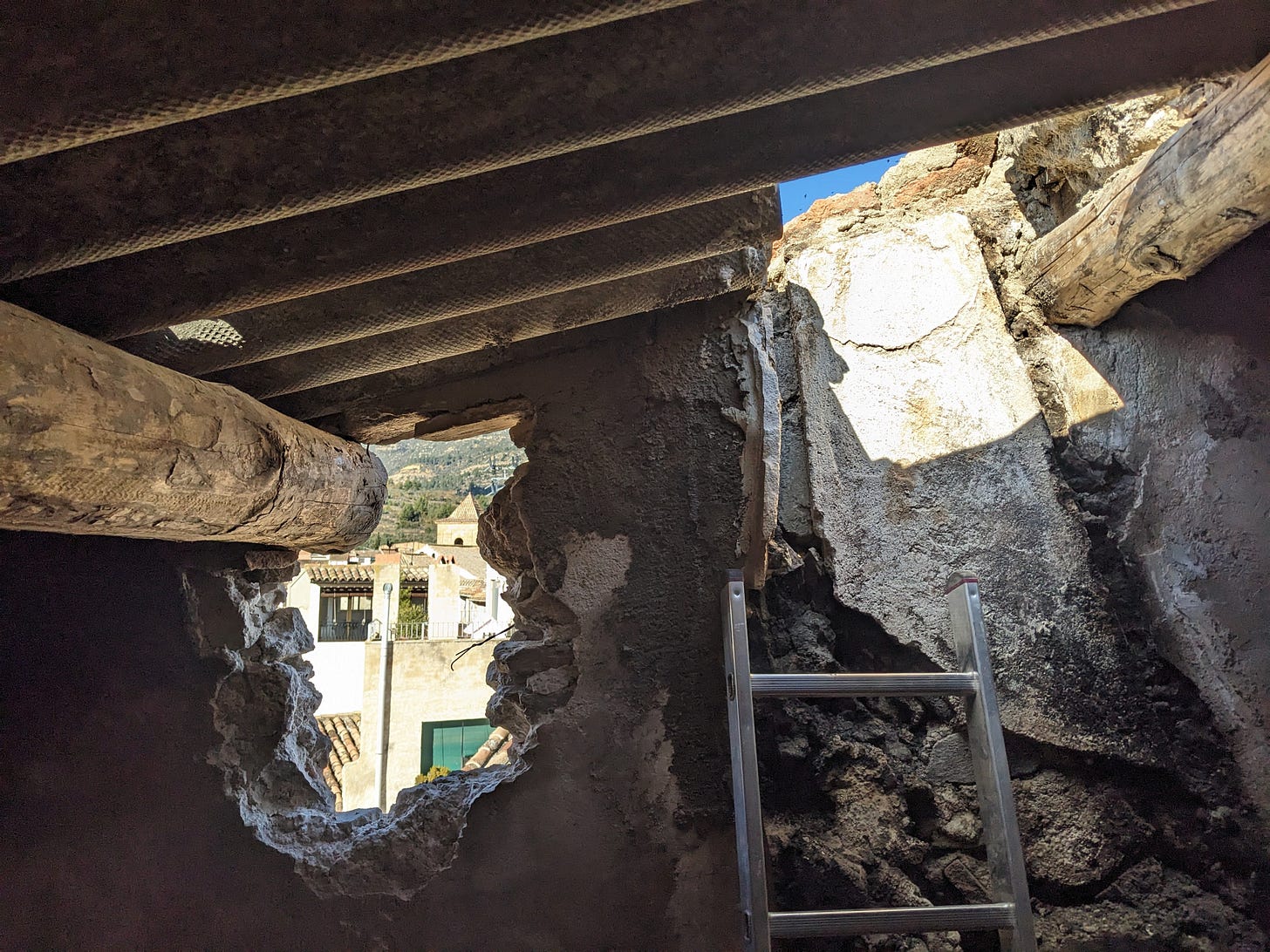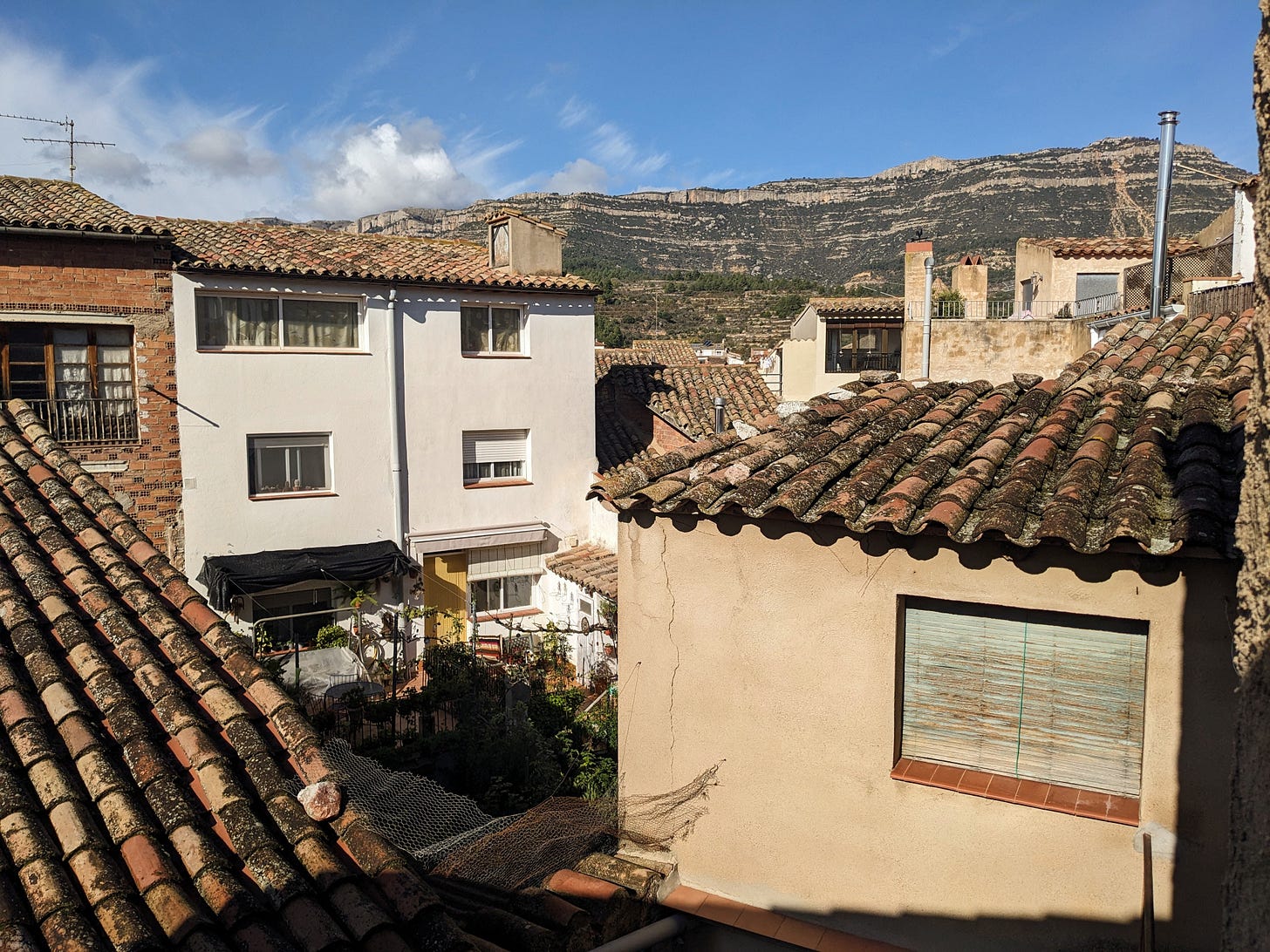The downside of small-town Catalan life
Work is halted, plus: my interview on "Dirtbag Rich," with Blake Boles
Greetings from Spain —
Yesterday, the conversation I recorded with Blake Boles for his new book went live wherever you find your podcasts (Spotify, Apple, his website, etc.).
I think the most notable thing about this interview is that no topic was out of bounds. Blake likes to try and get at the full picture of someone’s life, not limited to just work, or money, but also meaning, purpose, love, and the rest of it.
Among other things, we covered:
How I got myself in a position to only spend around 10 hours/week on paid work
Talking to my son about living a “dirtbag rich” lifestyle even when we were living in one of the wealthiest counties in the United States
Why too much money can actually limit your freedom
Developing friendships and relationships while being location-independent
What rock climbing shares with kitesurfing
And much more…
I. Another side to small-town Catalan life
The first conversation I ever had with my Catalan neighbor was mostly a lecture. He spent nearly half an hour explaining to me how the wall that separates my back terrace from his back terrace is in fact his wall.
I remember a lot of gesticulating—he liked also to repeat the same thing over and over. At first, I thought it was because he wanted to make sure I was understanding him correctly, but as subsequent conversations over the last year have revealed: no, he really does just like to repeat himself a lot.
My neighbor is friendly enough. He’s received packages for me. He likes to chat. I’m usually glad for the opportunity to practice my Spanish with him.
Then there was the time when his outdoor black cat (named “Meow”) chose an old wicker basket on the ground level of my home in which to birth three kittens. When we discovered them, my neighbor told my girlfriend and me that he’d planned to simply kill each of them with a hammer blow to the head—as he’d done before whenever Meow gave birth, which was every six months or so.
Upon hearing this plan, my girlfriend insisted that we find the kittens homes through an adoption agency. Gratefully, he acquiesced, also agreeing to bring Meow to finally get neutered. Thus an end was brought to the periodic killing of newborn kittens.
Anyway, last week I may have leaned a bit into the romantic side of small-town Catalan life, focusing on my neighbor’s daily tractor ride to a nearby olive grove, where he harvests olives for pressing at the local cooperative.
But obviously there is also another side to small-town living, a downside—and it’s not just about the kittens.
II. Privacy among neighbors
Last week, as I was standing on the rubble pile in my back terrace, my neighbor gave me another lecture.
This time it wasn’t about where his wall began and mine ended, but rather about how the hole I’d just punched in the wall on the fourth floor was now invading his privacy, because I could now use that hole as a window to look down on his back terrace.
It was a matter of ética, he said—ethics.
Of course, he was looking directly down and into my back terrace as he told me this, and I was looking up at his, which I noted in as friendly a voice as I could summon. To this, he could only respond that there was a distinction between his incidentally being able to see my entire back terrace, and him purposely leaning over his fence to look at the one square meter of terrace that he couldn’t naturally see.
In any case, I had to break it to him—I wasn’t planning a window up on my fourth floor, but a rooftop terrace. I pointed to his terrace, and to his neighbor’s rooftop terrace, and to the two other rooftop terraces we could both see from that spot, and I explained how I only wanted the same thing everyone else had.
The lecture persisted, covering what he understood to be the nuances of various Cornudella de Monstant building regulations, and how he could complain to the city if I did anything wrong.
I tried to set his mind at ease, explaining that I was working with a local architect and that I was relying on the architect to tell me what the exact rules were.
Still, I hadn’t formally submitted the building plans to the city. Which meant I was probably operating in a gray area. “Maintenance” inside my house was ok, as had been explained to me, but “major works” needed permitting and approval from the city. I still hadn’t bothered to look too closely at which was which.
When it got time to replace the roof, no doubt I would need to submit something. But until then, I’d mostly been working inside my house, out of view of the neighbors.
That changed last week when I decided to replace one of the beams that would eventually support the rooftop terrace. This involved making a hole in the wall that faced out to my neighbor’s back terrace—a hole he could clearly see.
So it wasn’t surprising that he’d taken a new interest in the work.
After around 45 minutes, I thought I had done what I could to assuage his concerns. On the other hand, the reality was that I was planning a pretty significant change to the property he’d been living next to his whole life, and which had been abandoned for at least a quarter century. It was natural that he question what I was doing.
When the conversation ended, I went inside, made myself some lunch, and promptly wrote an email to my architect: we need to submit plans to the city.
It was time to get official approval.

III. My neighbor complains
The next morning I got a knock on the door. It was another man, much younger, in casual business attire, who explained that he was from the town. Next to him, off to the side, was my neighbor, doing his best to not totally avoid eye contact. Meanwhile, I could see in the eyes of the guy from the town, this was an awkward situation for him as well.
Thus proceeded a repeat of much the same conversation I’d had the day before. He was nice enough about the whole thing. But replacing a beam, he told me, needed permission.
I promised to stop major work until we could finalize the building plans and submit them to the city. A few times, he spoke in Catalan to my neighbor, then relayed to me that he wantd me to know he was only concerned about my safety.
It was a white lie all three of us just agreed to go with for the time being.
There was one thing he said that was gratifying, though: We want these properties to be renovated. It’s not good for them to be neglected and falling apart.
It was nice to hear.
Small-town living can have its issues—namely that everyone knows each other’s business and can get a little nosey about it. But at least this small town seems to be more or less open to the influx of foreigners with a bit of money, mostly climbers, willing to buy and fix up old buildings like this one.



We're currently in the middle of a series of home renovations in Italy. Similar stories, different countries. I've had so many of these interactions that I've stopped finding them interesting. Hah thanks for the reminder to look at them from a different angle!
I have fallen in love with a condemned wreck of a building in a Portuguese village (not yet purchased), so can picture this scenario quite easily.